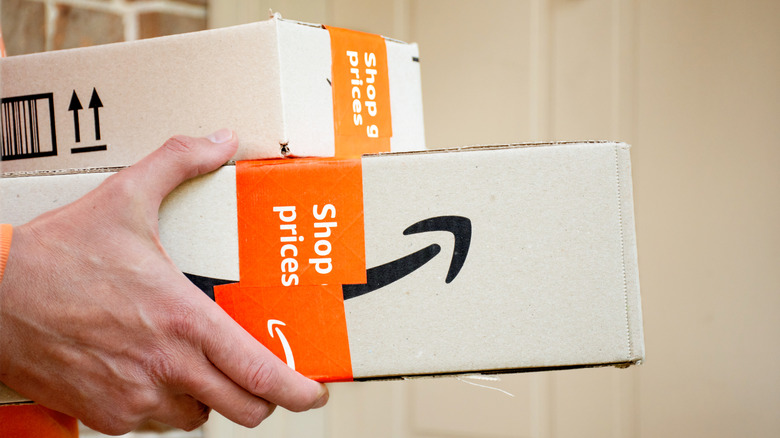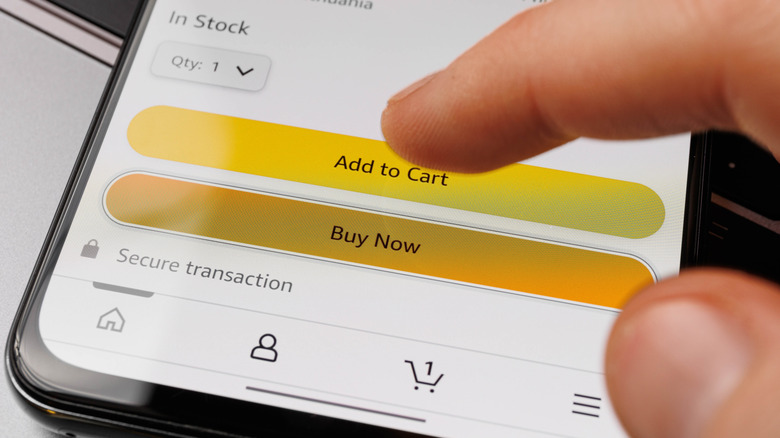The Amazon Review Red Flag That Means You Might Get Scammed
With inflation still impacting consumer prices in significant ways – Consumer Price Index data shows that prices are 23.3% more than they were in February 2020 – more and more consumers might be looking for deals when shopping. This can mean relying more heavily on online shopping marketplaces, where having a greater selection can often lead to more affordable choices. Chief among these online marketplaces is retail behemoth Amazon, and it's easy to understand why so many consumers rely on it — and spend so much on it every month.
According to a 2024 Price Wars study from Profitero comparing the online prices of more than 13,000 products across 22 online retailers, Amazon was the clear winner when it came to affordability. In fact, Amazon listed the lowest prices among its competitors across all 15 product categories in the study –- with prices ranging from 1% to 6% cheaper across essential products. While that might not sound like a considerable savings, and it is indeed a drop from previous years in which Amazon averaged 14% savings over its competitors, every little bit of savings can ultimately help you stay within your budget. However, as you might rely more heavily on Amazon in the coming months, it's more important than ever to shop smart and steer clear of avoidable online shopping mistakes and red flags. Perhaps some of the biggest things to avoid when shopping on Amazon are product pages containing stellar reviews for a completely different product than what is listed.
Third party vendors
One of the most important things to understand about Amazon's marketplace is the prevalence of third party vendors. Even though you are shopping on Amazon, chances are good the product you are looking at is actually being distributed by another company altogether — one that might want to scam you. Amazon has run into trouble in the past with its lack of oversight over these third party vendors — even losing out on brand deals with popular companies due to its unwillingness to regulate fake products and vendors. This is a major reason why you should avoid buying brands like Birkenstock on Amazon. While not all third party vendors on Amazon are scammers, as a consumer it's important to do your due diligence before checking out with your online cart.
A particularly popular way that these third party vendors can make their product seem more appealing than their competition centers on customer reviews. Since many consumers rely on reviews when deciding whether or not to purchase a specific product, these vendors will often use fake, padded, or unrelated reviews to create highly-rated products in the Amazon marketplace. Perhaps the worst example of this is when a vendor takes over or steals an existing product page with good reviews, changing the product to something else but leaving behind the glowing reviews for an entirely different item. These vendors are relying on the fact that many consumers will simply see a product's star rating and not bother to read the actual reviews lower down on a product's page.
Other red flags to watch out for
While seeing reviews praising a kitchen shelf on a product page for headphones might be a dead giveaway for some, there are other less obvious ways that third party vendors can similarly attempt to scam you. For starters, if the customer reviews left on a product are all extremely short, even single word, reviews then you might have a problem. Similarly, make sure to check the date on these reviews. If you find that a product has dozens of reviews all left within a short period of time, you could be dealing with a scammer.
This behavior can also be part of something known as a brushing scam — and even the United States Postal Service is on the lookout for this. In fact, in March 2025 the United States Postal Inspection Service updated its national alert regarding the dangers of brushing scams. In these scams, you as a consumer receive packages in the mail containing items you did not order — which often do not contain return addresses — so that the sender of said items can write fake reviews for these products under your name. While it might seem harmless enough to receive free products, the third-party seller can use this tactic to build up fake reviews and ratings for their products on marketplaces like Amazon. Also, some of these "free" packages can even contain QR codes that, once scanned, send you to fake websites designed to steal your data and personal information.


